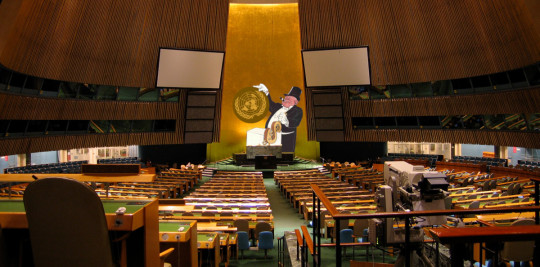#Prospera
Explore tagged Tumblr posts
Text
If you guys all behave well you might get more girlspero..
Or have her now I know y’all are rambunctious

#girlspero#it’s the same bun a last time I TOLD y’all I wasn’t drawing more.#genderbend#prospera#Nevermore#nevermore webtoon#fanart#edit#I love her
120 notes
·
View notes
Text
End of the line for corporate sovereignty

I'm on tour with my new, nationally bestselling novel The Bezzle! Catch me next weekend (Mar 30/31) in ANAHEIM at WONDERCON, then in Boston with Randall "XKCD" Munroe (Apr 11), then Providence (Apr 12), and beyond!

Back in the 1950s, a new, democratically elected Iranian government nationalized foreign oil interests. The UK and the US then backed a coup, deposing the progressive government with one more hospitable to foreign corporations:
https://en.wikipedia.org/wiki/Nationalization_of_the_Iranian_oil_industry
This nasty piece of geopolitical skullduggery led to the mother-of-all-blowbacks: the Anglo-American puppet regime was toppled by the Ayatollah and his cronies, who have led Iran ever since.
For the US and the UK, the lesson was clear: they needed a less kinetic way to ensure that sovereign countries around the world steered clear of policies that undermined the profits of their oil companies and other commercial giants. Thus, the "investor-state dispute settlement" (ISDS) was born.
The modern ISDS was perfected in the 1990s with the Energy Charter Treaty (ECT). The ECT was meant to foam the runway for western corporations seeking to take over ex-Soviet energy facilities, by making those new post-Glasnost governments promise to never pass laws that would undermine foreign companies' profits.
But as Nick Dearden writes for Jacobin, the western companies that pushed the east into the ECT failed to anticipate that ISDSes have their own form of blowback:
https://jacobin.com/2024/03/energy-charter-treaty-climate-change/
When the 2000s rolled around and countries like the Netherlands and Denmark started to pass rules to limit fossil fuels and promote renewables, German coal companies sued the shit out of these governments and forced them to either back off on their democratically negotiated policies, or to pay gigantic settlements to German corporations.
ISDS settlements are truly grotesque: they're not just a matter of buying out existing investments made by foreign companies and refunding them money spent on them. ISDS tribunals routinely order governments to pay foreign corporations all the profits they might have made from those investments.
For example, the UK company Rockhopper went after Italy for limiting offshore drilling in response to mass protests, and took $350m out of the Italian government. Now, Rockhopper only spent $50m on Adriatic oil exploration – the other $300m was to compensate Rockhopper for the profits it might have made if it actually got to pump oil off the Italian coast.
Governments, both left and right, grew steadily more outraged that ISDSes tied the hands of democratically elected lawmakers and subordinated their national sovereignty to corporate sovereignty. By 2023, nine EU countries were ready to pull out of the ECT.
But the ECT had another trick up its sleeve: a 20-year "sunset" clause that bound countries to go on enforcing the ECT's provisions – including ISDS rulings – for two decades after pulling out of the treaty. This prompted European governments to hit on the strategy of a simultaneous, mass withdrawal from the ECT, which would prevent companies registered in any of the ex-ECT countries from suing under the ECT.
It will not surprise you to learn that the UK did not join this pan-European coalition to wriggle out of the ECT. On the one hand, there's the Tories' commitment to markets above all else (as the Trashfuture podcast often points out, the UK government is the only neoliberal state so committed to austerity that it's actually dismantling its own police force). On the other hand, there's Rishi Sunak's planet-immolating promise to "max out North Sea oil."
But as the rest of the world transitions to renewables, different blocs in the UK – from unions to Tory MPs – are realizing that the country's membership in ECT and its fossil fuel commitment is going to make it a world leader in an increasingly irrelevant boondoggle – and so now the UK is also planning to pull out of the ECT.
As Dearden writes, the oil-loving, market-worshipping UK's departure from the ECT means that the whole idea of ISDSes is in danger. After all, some of the world's poorest countries are also fed up to the eyeballs with ISDSes and threatening to leave treaties that impose them.
One country has already pulled out: Honduras. Honduras is home to Prospera, a libertarian autonomous zone on the island of Roatan. Prospera was born after a US-backed drug kingpin named Porfirio Lobo Sosa overthrew the democratic government of Manuel Zelaya in 2009.
The Lobo Sosa regime established a system of special economic zones (known by their Spanish acronym, "ZEDEs"). Foreign investors who established a ZEDE would be exempted from Honduran law, allowing them to create "charter cities" with their own private criminal and civil code and tax system.
This was so extreme that the Honduran supreme court rejected the plan, so Lobo Sosa fired the court and replaced them with cronies who'd back his play.
A group of crypto bros capitalized on this development, using various ruses to establish a ZEDE on the island of Roatan, a largely English-speaking, Afro-Carribean island known for its marine reserve, its SCUBA diving, and its cruise ship port. This "charter city" included every bizarre idea from the long history of doomed "libertarian exit" projects, so ably recounted in Raymond Craib's excellent 2022 book Adventure Capitalism:
https://pluralistic.net/2022/06/14/this-way-to-the-egress/#terra-nullius
Right from the start, Prospera was ill starred. Paul Romer, the Nobel-winning economist most closely associated with the idea of charter cities, disavowed the project. Locals hated it – the tourist shops and restaurants on Roatan all may sport dusty "Bitcoin accepted here" signs, but not one of those shops takes cryptocurrency.
But the real danger to Prospera came from democracy itself. When Xiomara Castro – wife of Manuel Zelaya – was elected president in 2021, she announced an end to the ZEDE program. Prospera countered by suing Honduras under the ISDS provisions of the Central America Free Trade Agreements, seeking $10b, a third of the country's GDP.
In response, President Castro announced her country's departure from CAFTA, and the World Bank's International Centre for Settlement of Investment Disputes:
https://theintercept.com/2024/03/19/honduras-crypto-investors-world-bank-prospera/
An open letter by progressive economists in support of President Castro condemns ISDSes for costing latinamerican countries $30b in corporate compensation, triggered by laws protecting labor rights, vulnerable ecosystems and the climate:
https://progressive.international/wire/2024-03-18-economists-the-era-of-corporate-supremacy-in-the-international-trade-system-is-coming-to-an-end/en
As Ryan Grim writes for The Intercept, the ZEDE law is wildly unpopular with the Honduran people, and Merrick Garland called the Lobo Sosa regime that created it "a narco-state where violent drug traffickers were allowed to operate with virtual impunity":
https://theintercept.com/2024/03/19/honduras-crypto-investors-world-bank-prospera/
The world's worst people are furious and terrified about Honduras's withdrawal from its ISDS. After 60+ years of wrapping democracy in chains to protect corporate profits, the collapse of the corporate kangaroo courts that override democratic laws represents a serious threat to oligarchy.
As Dearden writes, "elsewhere in the world, ISDS cases have been brought specifically on the basis that governments have not done enough to suppress protest movements in the interests of foreign capital."
It's not just poor countries in the global south, either. When Australia passed a plain-packaging law for tobacco, Philip Morris relocated offshore in order to bring an ISDS case against the Australian government in a bid to remove impediments to tobacco sales:
https://isds.bilaterals.org/?philip-morris-vs-australia-isds
And in 2015, the WTO sanctioned the US government for its "dolphin-safe" tuna labeling, arguing that this eroded the profits of corporations that fished for tuna in ways that killed a lot of dolphins:
https://theintercept.com/2015/11/24/wto-ruling-on-dolphin-safe-tuna-labeling-illustrates-supremacy-of-trade-agreements/
In Canada, the Conservative hero Steven Harper entered into the Canada-China Foreign Investment Promotion and Protection Agreement, which banned Canada from passing laws that undermined the profits of Chinese corporations for 31 years (the rule expires in 2045):
https://www.vancouverobserver.com/news/harper-oks-potentially-unconstitutional-china-canada-fipa-deal-coming-force-october-1
Harper's successor, Justin Trudeau, went on to sign the Canada-EU Trade Agreement that Harper negotiated, including its ISDS provisions that let EU corporations override Canadian laws:
https://www.cbc.ca/news/politics/trudeau-eu-parliament-schulz-ceta-1.3415689
There was a time when any challenge to ISDS was a political third rail. Back in 2015, even hinting that ISDSes should be slightly modified would send corporate thinktanks into a frenzy:
https://www.techdirt.com/2015/07/20/eu-proposes-to-reform-corporate-sovereignty-slightly-us-think-tank-goes-into-panic-mode/
But over the years, there's been a growing consensus that nations can only be sovereign if corporations aren't. It's one thing to treat corporations as "persons," but another thing altogether to elevate them above personhood and subordinate entire nations to their whims.
With the world's richest countries pulling out of ISDSes alongside the world's poorest ones, it's feeling like the end of the road for this particularly nasty form of corporate corruption.
And not a moment too soon.

If you'd like an essay-formatted version of this post to read or share, here's a link to it on pluralistic.net, my surveillance-free, ad-free, tracker-free blog:
https://pluralistic.net/2024/03/27/korporate-kangaroo-kourts/#corporate-sovereignty

Image: ChrisErbach (modified) https://commons.wikimedia.org/wiki/File:UnitedNations_GeneralAssemblyChamber.jpg
CC BY-SA 3.0 https://creativecommons.org/licenses/by-sa/3.0/deed.en
#pluralistic#isds#investor state dispute settlement#steven harper#canada#canpoli#ukpoli#honduras#prospera#roatan#Energy Charter Treaty#ect#eu#rockhopper#world bank#charter cities#cryptocurrency#libertarian exit#Xiomara Castro
222 notes
·
View notes
Text

#helen mirren#prospera#the tempest#made a thing#got inspired#my art#my artwork#hope you like#this one took a while#really proud of it#by ve#art by ve#helen mirren so bad ass in this#100% recommend#shakespeare#2010 movie
5 notes
·
View notes
Text
Neat






assorted g witch drawings
#seajjae illustrations#gundam witch from mercury#digital art#mobile suit gundam#suletta mercury#g witch#miorine rembran#suletta x miorine#sulemio#guel jeturk#prospera#prospera mercury#comic
2K notes
·
View notes
Text
Aceptan ciudadanos del Acapulco poniente y miembros de AHETA propuesta de Manuel Añorve

ACAPULCO, Gro. * Mayo 23, 2024. ) Especial El candidato al Senado de la República de la Coalición Fuerza y Corazón por México, Manuel Añorve Baños, realizó una caminata casa por casa por calles de la zona poniente de Acapulco, junto a la candidata a diputada Brisbane de los Santos. Añorve tocó las puertas de los ciudadanos, quienes las abrieron con gusto para escuchar el planteamiento de sus propuestas, como el regreso del Seguro Popular, Prospera y la reducción de edad, para que las personas puedan ingresar a los 60 años al programa de pensión para los Adultos Mayores, y no a los 65 años como está estipulado actualmente. Durante su recorrido por la Delegación Jardín, en la colonia Paraíso, Añorve Baños fue abordado por vecinos del lugar, quienes le recordaron las obras que ha realizado en esta parte de la ciudad, como las calles con concreto hidráulico, la unidad deportiva de la Jardin Azteca, y las canchas techadas de usos múltiples, ahí estuvo presente el dirigente estatal de la CTM, Rodolfo Escobar Ávila. Más tarde, sostuvo un encuentro con pescadores de la Federación del Clarín, presidida por José Delgado Vargas; ahí los pescadores le recordaron a Añorve que cuando fue presidente de Acapulco, logró liberarles el acceso al mar para que ellos pudieran ingresar a pescar con sus embarcaciones, y así poder generar economía para sus familias. Por la mañana, Manuel Añorve sostuvo un diálogo junto con el candidato a alcalde de Acapulco, con integrantes de la Asociación de Hoteles y Empresas Turísticas de Acapulco (AHETA), en este encuentro, el abanderado de la alianza Fuerza y Corazón por México, les dijo que es urgente que desde el gobierno federal se realice un plan y una estrategia que permita la reactivación turística del puerto. En este sentido, lamentó que no exista un programa real de apoyos para los empresarios, hoteleros y restauranteros, con el cual puedan reconstruir sus negocios, con los que generan cientos de fuentes de empleos, por lo que hizo un llamado a la implementación de créditos a la palabra y créditos sin intereses, para que puedan volver a poner en funcionamiento las pequeñas y medianas empresas dedicadas a la actividad turística. ) acapulcopress.com Read the full article
#AdultosMayores#BrisbanedelosSantos#CoaliciónFuerzayCorazónporMéxico#ManuelAñorveBaños#Prospera#SeguroPopular#SenadodelaRepública
0 notes
Text

🌈 : @prosperae // lyric starter // accepting

these lyrics were taken from i can do it with a broken heart
"you know you're good when you can even do it with a broken heart."
#prospera#「 robin x eddie (004 / prosperae) 」#「┊🌈 ┊( interactions. ) 」#「 🌈 hey dingus your queue is here : queued 」#( add to thread tracker )#「┊🌈 ┊ ( closed starter. ) 」
0 notes
Text
Trotz kryptofreundlicher Freihandelszone: Honduras verbietet Finanzinstitutionen Umgang mit Kryptowährungen
Trotz kryptofreundlicher Freihandelszone: Honduras verbietet Finanzinstitutionen Umgang mit Kryptowährungen Eigentlich hätte man von Honduras als Heimat der kryptofreundlichen Freihandelszone Prospera etwas anderes erwartet. Nun stellt die Finanzaufsicht jedoch klar, dass sie keine Krypto-Ökonomie dulden möchte.
Eigentlich hätte man von Honduras als Heimat der kryptofreundlichen Freihandelszone Prospera etwas anderes erwartet. Nun stellt die Finanzaufsicht jedoch klar, dass sie keine Krypto-Ökonomie dulden möchte. Continue reading Trotz kryptofreundlicher Freihandelszone: Honduras verbietet Finanzinstitutionen Umgang mit Kryptowährungen

View On WordPress
1 note
·
View note
Text

#not sure if someone already made this#gundam the witch from mercury#mobile suit gundam the witch from mercury#gundam suisei no majo#gundam witch#gundam witch from mercury#suletta mercury#prospera mercury#g witch#gwitch#witch from mercury#gwitch suletta#g witch prospera
4K notes
·
View notes
Text
It’s time for a new poll.
#shakespeare#helen mirren#the tempest#the tempest 2010#prospera#russell t davies#a midsummer night's dream#polls
0 notes
Note
Here, I made the Gay peoples mom spectrum

the Crystal Gems told there child how murder is wrong and he should seek the non-violent solution whenever possible. Prospera told her child that murder is how her special little girl can grow up big and strong. The duality of gay peoples moms.
American Magic Gay vs. Japanese Magic Gay
#she-ra#she ra and the princesses of power#mobile suit gundam witch of mercury#steven universe#prospera#murder is okay#shadow weaver#amethyst#pearl#garnet
24 notes
·
View notes
Text

What a time to be alive!
902 notes
·
View notes
Text
prospera in the high school au be like “that man delling bought up our company then shut down our research project before firing us all and now i must get revenge by training my daughter into a lacrosse star so she’ll be the school’s top athlete and end up marrying his daughter”
#mobile suit gundam the witch from mercury#g witch#sulemio#prospera mercury#delling rembran#suletta mercury#miorine rembran
566 notes
·
View notes
Text


Hot cocoa on Mother's Day
818 notes
·
View notes
Text
It's such a hilarious choice by Witch from Mercury to have Prospera tell the Benerit Group that she can't take off her helmet because most of her face and body was ravaged from being on Mercury only to have her show her face with her helmet off while on a video call with Suletta in the beginning of the very next episode
It's like they were saying "Just to make it clear she's a lying liar who lies"
207 notes
·
View notes
Text

another werewolf au… but make it red riding hood(kinda)
+ a quick thingy of mio feelin her teeth !!

#g witch#gundam witch from mercury#gundam wfm#the witch from mercury#suletta mercury#miorine rembran#sulemio#mioletta#werewolf au#werewolf x red riding hood au#gonna do a page for prospera at some point#I have lots of brainworms about this
1K notes
·
View notes
Text

I love getting to make use of my PNG of Prospera's mask.
263 notes
·
View notes